CIHR Institute of Aging Strategic Plan 2023-2028
Reframing Aging – Empowering Older Adults
- Introduction and Context
- Strategic Direction A: Implement Prevention Strategies and Promote Health and Wellbeing in Aging
- Strategic Direction B: Adapt Health and Care Systems to Better Address the Needs of Older Adults
- Strategic Direction C: Improve Lived and Living Experiences and Quality of Care in the Later Years
- Cross Cutting Priorities
- Looking Forward
Introduction and Context
-
Land Acknowledgement
We respectfully acknowledge that this Plan was developed at Western University located on the traditional lands of the Anishinaabek, Haudenosaunee, Lūnaapéewak and Attawandaron Peoples, on lands connected with the London Township and Sombra Treaties of 1796 and the Dish with One Spoon Covenant Wampum. This land continues to be home to diverse Indigenous Peoples whom we recognize as the original caretakers of the land and contemporary stewards of the land. From coast to coast to coast, we acknowledge the ancestral and unceded territory of all the First Nations, Inuit and Métis People that call this land home. We work towards healing and reconciliation with all Indigenous Peoples and renewing respectful relationships with Indigenous communities through our engagement, research and community service activities.
-
Message from the Scientific Director

Now more than ever, two critical drivers signal the need to prioritize the health and wellbeing of older adults in Canada. First is the impact of COVID-19 and the evolving needs of older adults throughout post-pandemic recovery. Second is Canada's shifting population demographics, with unprecedented increases in the number of older adults that will continue into the coming decades. These present us with new priorities, possibilities for collaboration and opportunities for the future. As we set out our strategic directions for the years ahead, Canada's research on aging community can and must play a role in addressing these drivers and their impacts to empower older adults and promote health and wellbeing at every stage.
COVID-19 substantially affected the lives of older adults in Canada and around the world. After almost three years of pandemic life, older adults have faced ageism, restricted health care, risk to mental health associated with loneliness and isolation, and increases in cognitive impairment and frailty. Despite these adverse circumstances, we have seen tremendous resilience in older adults and increasing interest in health promotion, risk reduction and a focus on health in aging. There is also increased attention on older adults being able to age in the right places, with appropriate and equitable supports.
As Canada supports demographic changes and a rapidly growing older population, research is needed to advance our understanding of what comprises health in aging and to implement effective models of care through integrated care systems. Our new strategic directions place healthy aging, risk reduction and mitigation at the forefront, while we remain focused on reducing the impact of complex health challenges. By fostering and mobilizing knowledge and ways of knowing, we will drive toward health equity for all ages, and an end to ageism, as we look to improve the health span in the later years for all older adults. Together as a community, we can help reframe age and aging so that older adults are rightfully valued as active and essential members of and contributors to society.
This Strategic Plan is founded on input and wisdom from many voices from across our community and carries forward the work of our Institute's previous Scientific Directors and Institute Advisory Board members, whom I wish to thank. I also thank our outstanding team at the CIHR Institute of Aging – Joanne Goldberg, Dr. Flamine Alary, Dr. Susan Rogers, Dr. Patricia Versteegh, Etienne Murgues, Theresa Noonan and Teresa Ford – for their passion and commitment to our mission and work, and to our colleagues at CIHR and other CIHR Institutes for their support, collegiality and partnership. I am grateful to the members of our current Institute Advisory Board, Older Adult Advisory Council and Regional Councils for their valuable insights and expertise during the creation of this Strategic Plan. We are indebted to our research on aging community for ongoing engagement, including informing our strategic directions and priorities.
I am honoured to be able to work with our community to achieve the vision of this new Strategic Plan for the CIHR Institute of Aging with the goal of Reframing Aging and Empowering Older Adults as we promote Research to Achieve Equitable Health in Aging.
R. Jane Rylett, PhD, FCAHS
Scientific Director, CIHR Institute of Aging
Distinguished University Professor
Scientist, Robarts Research Institute
University of Western Ontario -
Message from the Institute Advisory Board Chair

There has probably never been a more important time than now to focus on older adults and address the knowledge gaps in research that inform the way we support health and well-being of Canada's aging population. The Institute of Aging plays a national leadership role in supporting research excellence in this area. Creating a strategic plan for the Institute of Aging is not something we can do on our own. This plan was guided by input received from thousands of stakeholders across the country on what is important to them and reflects the poignant voices of those with lived experience, research centres with a focus on aging, our own Institute Advisory Board members and national researchers.
Equity, Diversity, and Inclusion is critical to all the research that we conduct. Older adults of all genders, age, race, Indigenous groups, and socio-economic backgrounds need to be considered in all research, not just research supported by the Institute of Aging, to ensure better quality and more well-rounded evidence that can be tailored to diverse areas of study to ultimately improve the health and social care of older adults.
Paula A. Rochon MD, MPH, FRCPC
Founding Director, Women's Age Lab, Women's College Hospital
Professor, Department of Medicine and Dalla Lana School of Public Health
RTO/ERO Chair in Geriatric Medicine
University of Toronto -
The CIHR Institute of Aging and our Community
Our Institute
The Institute of Aging is one of thirteen Institutes of the Canadian Institutes of Health Research (CIHR), Canada's federal agency that funds health research. Our mandate is "to support research, to promote healthy aging and to address the causes, prevention, screening, diagnosis, treatment, support systems and palliation for the complex health challenges that can be present in older individuals." This mandate covers all research areas related to aging and older persons, from the biology of aging to public health, and fosters excellence in all its diversity in research and training. With a goal of delivering on the CIHR Strategic Plan, we work collaboratively with other CIHR Institutes and branches to partner on major initiatives and programs and develop strategic funding opportunities for researchers and trainees, focusing on investigations that promote the health of older adults.
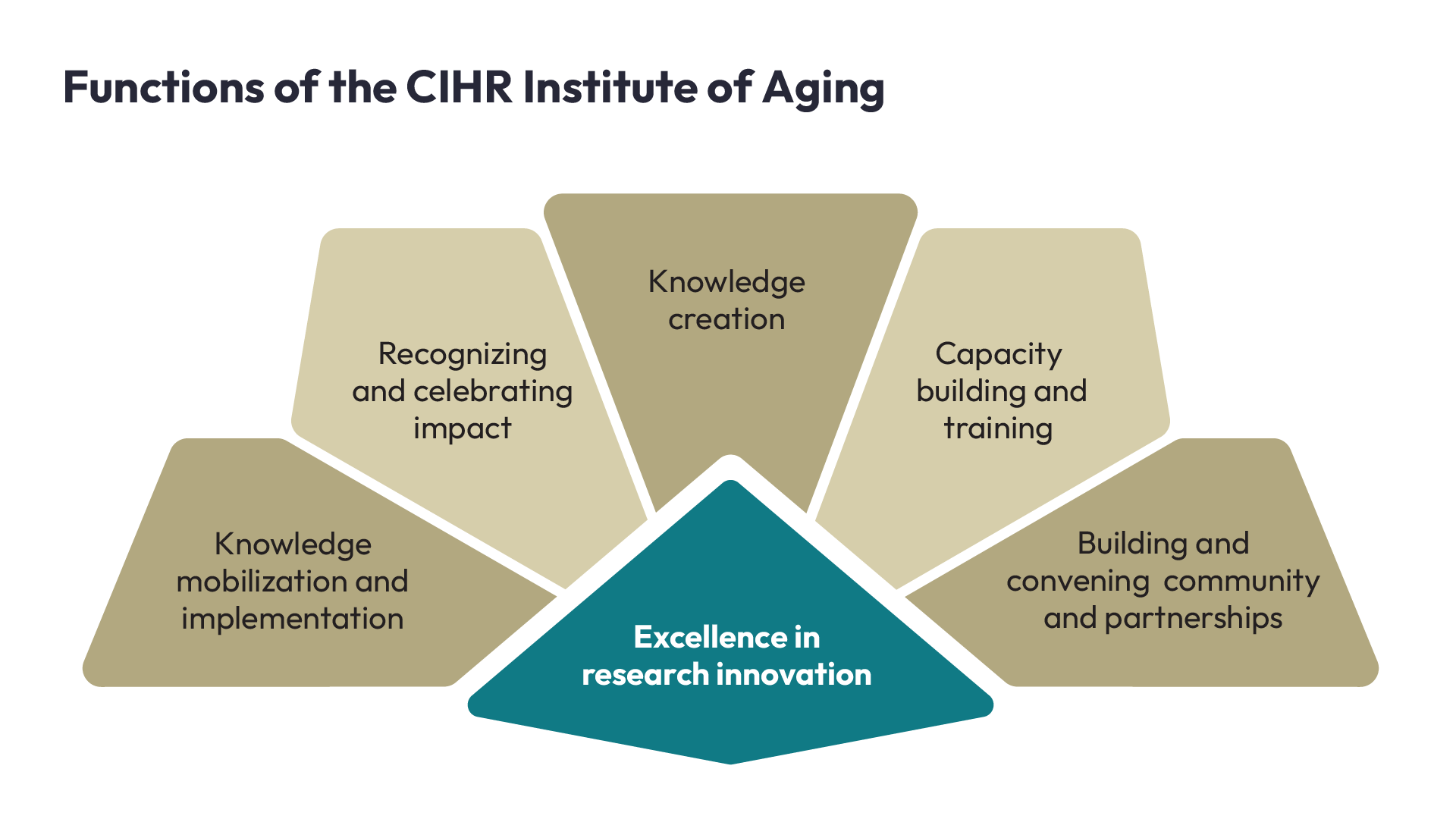
Long Description
Figure 1. Functions of the CIHR Institute of Aging promote excellence in research innovation.
- Knowledge mobilization and implementation
- Knowledge creation
- Building and convening community and partnerships
- Capacity building and training
- Recognizing and celebrating impact
The Research on Aging Community
Canada's research on aging community includes many dedicated and passionate people engaging in research to enable healthy aging for all older Canadians. This includes researchers, research teams and trainees, funding agencies, knowledge users, health organizations, health charities, patient partners, persons with lived and living experience and their caregivers, innovation and private sector organizations, policy makers and many others.
"CIHR Institute of Aging provides the connecting thread that ties together research centres on aging across Canada forming a research community and network on aging and health. This community is enriched by the Institute's summer program in aging that brings together gerontology leaders of tomorrow."
A robust and dynamic research on aging community exists in Canada, bringing together investigators with expertise spanning the four research pillars of CIHR: biomedical; clinical; health services; and social cultural, environmental and population health research. With Canada's rapidly aging population, there is a critical need for substantially more research and researchers, along with increases in geriatric medicine and clinical specialties devoted to the health of older adults, to create knowledge and implement evidence-informed approaches to support healthy aging of older adults within their unique context. We aim to address this need by engaging with and supporting the research on aging community, and work strategically to strengthen and expand partnerships. With over 40 research centres on aging in Canada, we also convene the Directors of the Canadian Research Centers on Aging to strengthen research on aging in Canada, build relationships between our Institute and researchers and stimulate knowledge sharing and impact.
Guided by Lived and Living Experience
"Release of the Institute of Aging's Strategic Plan coincides with society's increasing interest in healthy aging and living a longer and active life. The Plan provides different strategic priorities for research all with the same goal in mind, that of respect for the individual older adult and their human rights. I applaud the Institute for signalling their intent to be "guided" by the living experiences of older adults across the country."
Older adults and their caregivers are vital voices that inform the work of our Institute. We receive strategic input and advice from our diverse Institute Advisory Board, which includes older adults, patient partners and national and international experts in the field of research on aging and policy. In 2021, we assembled an Older Adult Advisory Council to hear from and engage older adults and caregivers of older adults from across the country in our work, with the aim of hearing their valuable perspectives, learning from their lived and living experiences and addressing the diverse needs of older Canadians. In response to increasing interest from older adults to participate in our work, we developed four Regional Councils to hear from more older adults and caregivers across Canada. The Older Adult Advisory Council and Regional Councils were actively engaged in the development of this Strategic Plan, ensuring that our priorities reflect and address the current and long-term needs of the older adults we serve.
-
Our Vision, Mission, Values and Ongoing Commitments
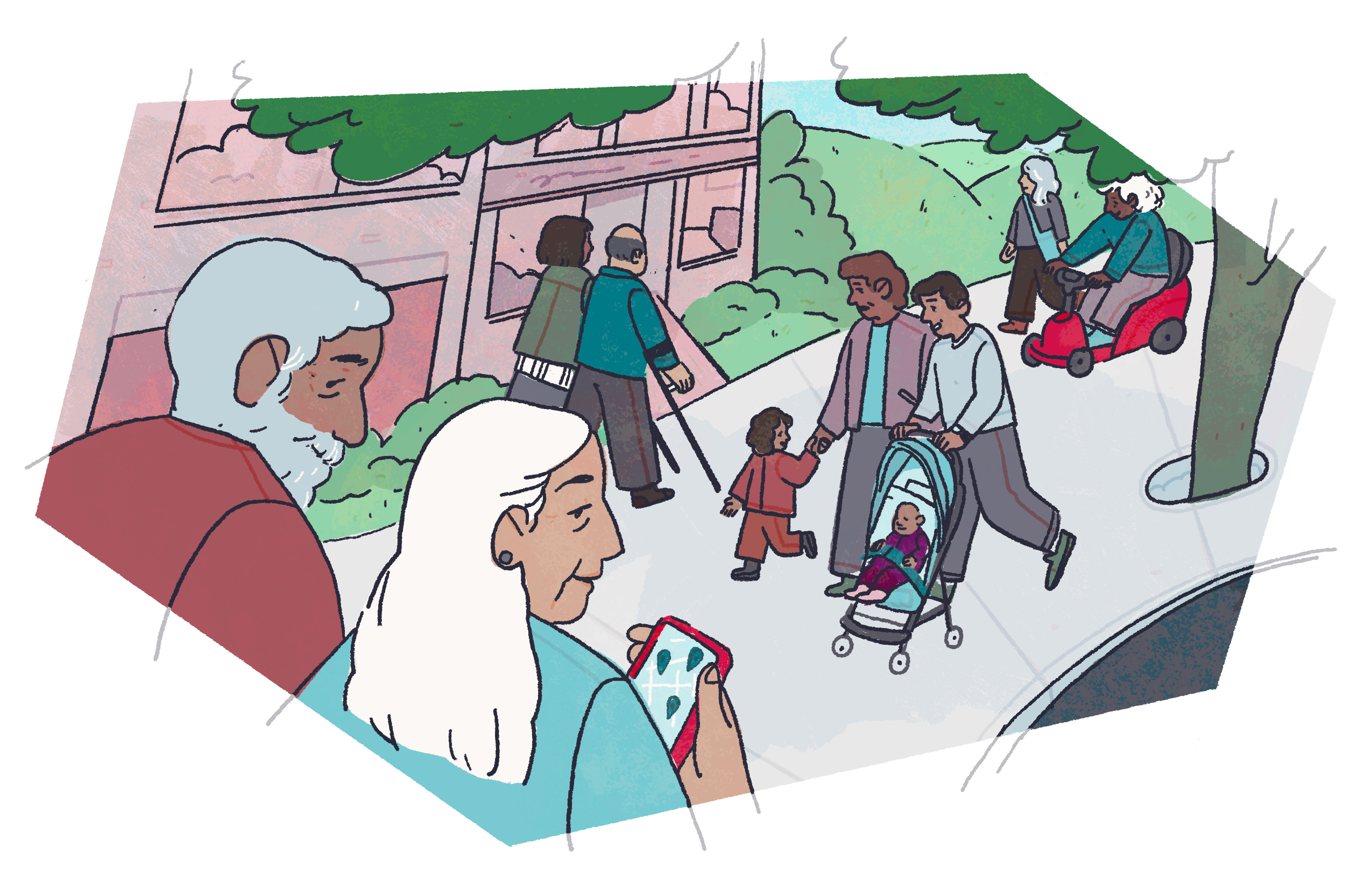
Vision
Foster research excellence to achieve equitable health outcomes and enable healthy aging for all older Canadians.
Mission
Advance training, research and knowledge mobilization to maintain and improve the health and wellbeing of all Canadians as they age.
Values and Principles
Research Excellence
We emphasize the importance of innovation and continuous improvement in all our work. By championing an inclusive approach to research excellence that considers health across the life course, we fund high-quality, evidence-based research that informs public policy, programs and services addressing the opportunities and challenges of aging, and promote accessibility of research and evidence through open science.
Equity, Diversity and Inclusion and Intersectionality
We are committed to supporting the principles of equity (fairness), diversity (representation), and inclusion (valued participation) across our activities. We aim to enable greater engagement of historically underrepresented groups in the entire research system to improve equity in care and support services. We are committed to combating ageism, ensuring cultural safety, language equity and intersectional approaches in all our activities, and addressing the impacts of social and structural determinants of health on aging.
Respect for First Nations, Inuit and Métis Peoples and Indigenous Rights
Guided by a commitment to reconciliation and allyship and a recognition that Indigenous Peoples are rights-holding as First Peoples of Canada, we will engage with Indigenous communities and health researchers to collaborate in distinctions-based research activities. We support community-based research to maintain and improve the health and wellbeing of First Nations, Inuit and Métis Peoples and respect Indigenous ways of knowing and being and a right to self-determination.
Collaboration, Partnerships and Engagement
We prioritize and value collaboration and partnerships with diverse voices and organizations across our community to collectively enhance and mobilize knowledge and resources and encourage evidence-informed practices and policies that address the needs of older adults. We champion older adults as active and valuable contributors to society, and promote the inclusion of age, aging and the role of persons with lived and living experiences and their caregivers in the entire research ecosystem.
Integrity, Accountability and Transparency
We recognize integrity, transparency and accountability as central to all our activities, from decision-making and communications to approaches towards strategic investments. We support a learning health systems model, fostering partnerships between researchers and end users to integrate real-time evidence, experiences and data with the aim of continuous improvement in health services and models of care.
Ongoing Commitments
To strengthen research in strategic areas within our mandate, we provide leadership and support to major national research platforms, including the Canadian Longitudinal Study on Aging (CLSA), the Canadian Consortium on Neurodegeneration in Aging (CCNA) and, most recently, the Brain Health and Cognitive Impairment in Aging (BHCIA) Research Initiative.
Creation of the CLSA was championed by the Institute of Aging in 2009 as a platform for data that supports population-based research and evidence-informed decision-making that can improve the health and wellbeing of all Canadians. Longitudinal studies on aging also serve as a crucial element for developing solutions for healthy living across the life course. The CLSA follows 50,000 middle-aged and older Canadian men and women for a period of 20 years, collecting information on the changing biological, medical, psychological, social and economic aspects of people's lives. These factors will be studied to understand, individually and in combination, their impact on maintaining health and on the development of disease and disability with aging.
The scope of the BHCIA Research Initiative encompasses research across the continuum from the healthy aging brain through cognitive impairment to the care of people living with dementia. CCNA, an important component of the BHCIA Research Initiative, was created in 2014 as a research hub for collaborative and synergistic studies on neurodegenerative diseases in aging. The Institute of Aging has been the lead CIHR Institute supporting the CCNA in its mission to bring together the best Canadian researchers in the field to address transformative research ideas to make a difference in the quality of life and services for those living with the effects of neurodegenerative diseases affecting cognition and their caregivers.
-
Addressing the Needs of an Aging Population in Canada
Canada's population is aging, and our Strategic Plan is shaped by the changing demographics, the population projections for the coming years and the specific context in which older Canadians live – today and into the future. The baby boomer generation is still the largest cohort in Canada despite their advancing age, and it is predicted that population aging will increase for at least the next 20 years as baby boomers continue to age.
Canada’s Older Adult Population
The older adult population in Canada is a heterogenous group – meaning that there are multifaceted differences between individuals within the age group. Older adults have a range of aspirations and goals, health status and needs for care and social support systems over the later decades of life. Poor health is not a necessary consequence of living into the later years. Many people living into their 70s, 80s, and 90s experience good health and active lifestyles. However, the impact of aging on health can vary widely among individuals, influenced by genetics, environment, life experiences, lifestyle and social and structural determinants such as gender, race and socioeconomic factors. The distinction between middle age and older age is increasingly blurred with persons of varying health status falling along the entire older age continuum. Men and women also have different representation in the oldest age groups, with women having longer life spans. Today, more than 80% of centenarians (those aged 100 years and older) are women.
As we increasingly recognize heterogeneity among Canada's older adult population, negative perceptions of age and aging persist – and they come with real health consequences. Ageism, coupled with stigma, systemic racism and discrimination, gender bias, ableism and socioeconomic inequities, can lead to social isolation and inadequate care, negatively impact health and even lead to premature deathFootnote 1. The United Nations Decade of Health Ageing 2021-2030Footnote 2 identifies combating ageism as a priority area, stating for example that ageism in clinical trials and health care delivery impacts the health of older adults. It is important to note that while ageism is most often directed to older adults, ageist behaviours can also be directed towards persons of all ages, including children and youth.
Shifting Demographics in the Coming Years
Declining mortality rates, significant increases in life expectancy and the aging of baby boomers, coupled with decreasing birth rates, are expected to lead to a demographic shift, resulting in an older population in Canada. In 2011, the oldest of the baby boomer generation reached the age of 65 years, beginning a new wave of older adults in Canada. Since 2016, the number of persons aged 65 years and older has exceeded the number of children and youth aged 15 years and younger, and this gap is increasing. In 2021, over seven million people were aged 65 years and older, an increase of almost 20% from 2016. This age group represents 19% of the Canadian population, bringing Canada very close to the United Nations definition of a super-aged society, in which at least 20% of the total population is aged 65 years and older. The population of Canadians aged 75 years and older is expected to double in the next 20 years and, according to population projections, the number of Canadians aged 85 years and older could triple to almost 2.5 million people by year 2046.
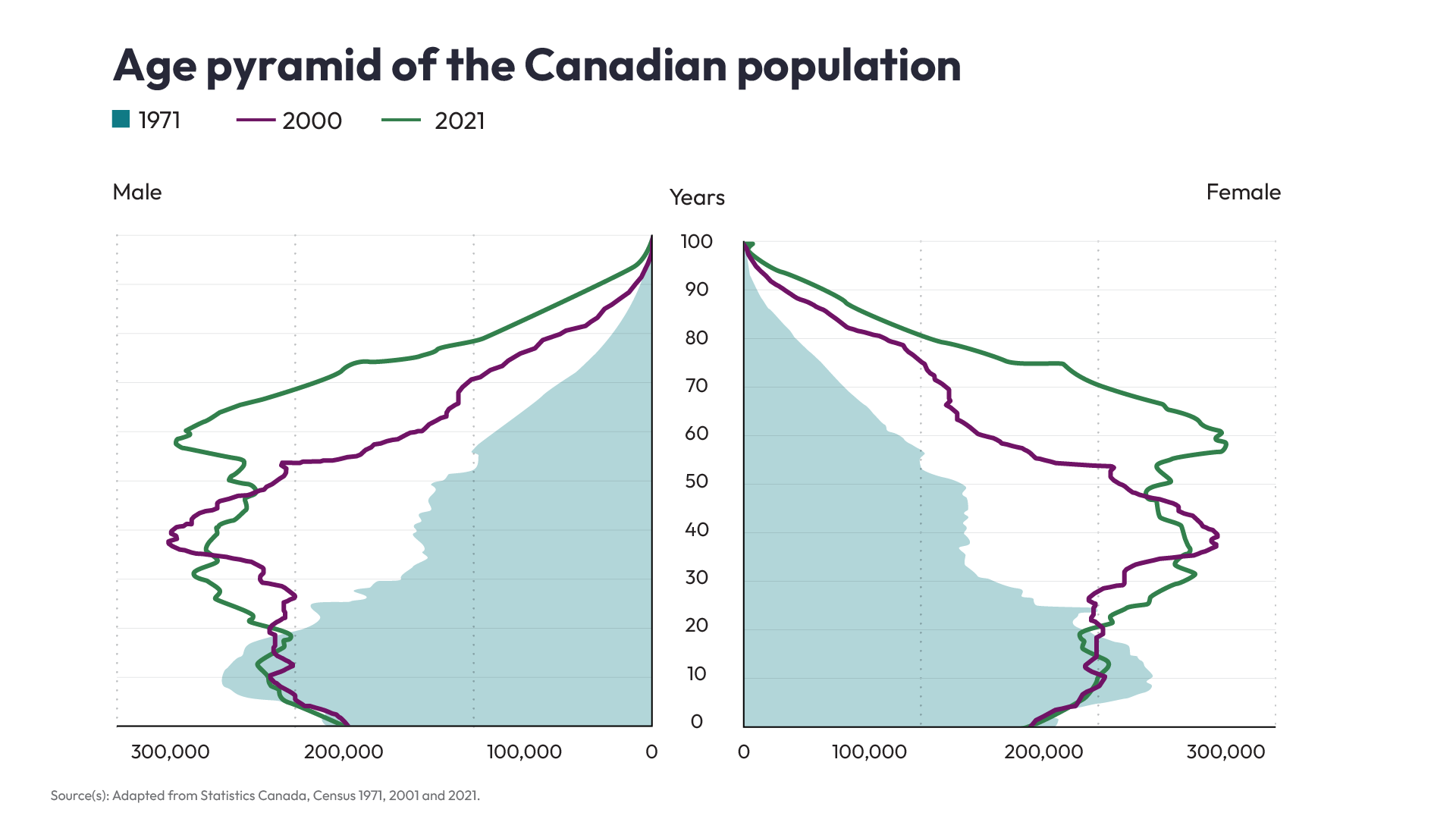
Long Description
Figure 2. Age Pyramid of the Canadian Population. The pyramid charts the demographic changes in Canada's population, highlighting data from 1971, 2000 and 2021. In 2021, over seven million people were aged 65 years and older, an increase of almost 20% from 2016.
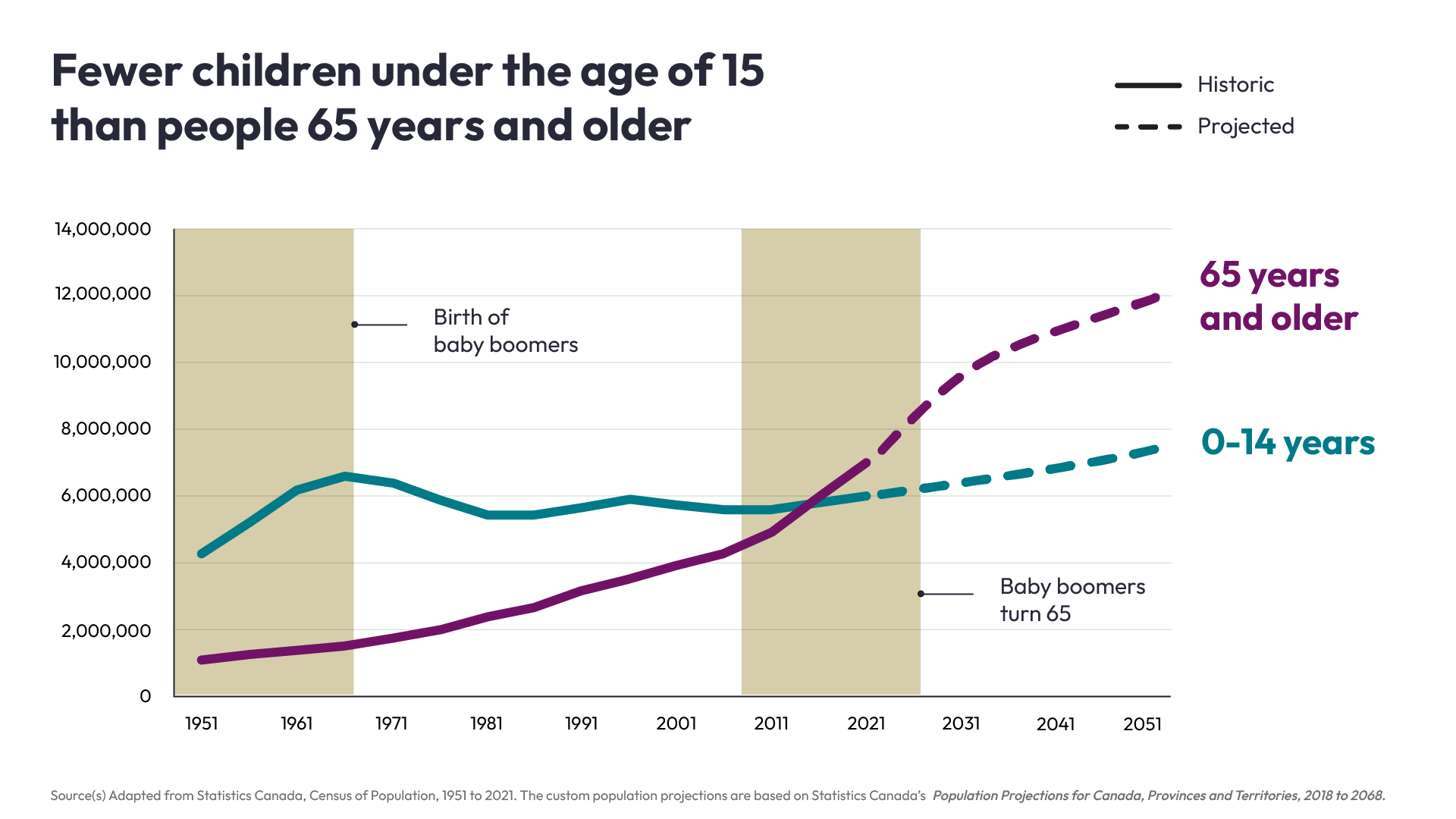
Long Description
Figure 3. A graph charting aging among the Baby Boomer generation and new babies being born in Canada. There are now fewer children under the age of 15 than people 65 years and older, and this trend is increasing.
Healthy Aging and the Impact of Chronic Conditions
The 2021 report from the Public Health Agency of Canada (PHAC) on Aging and Chronic Diseases: A Profile of Canadian SeniorsFootnote 3 details that half of older Canadians perceive their health as very good to excellent, despite many more living with age-related chronic diseases. This may reflect the perception of health status being related to other factors such as economic security, social connectedness and psychological wellbeing and not only physical health. Over one-third of older Canadians have two or more chronic conditions, and while individuals may continue to sustain functional abilities, chronic conditions can affect daily living, increase the need for health and care services, reduce quality of life and increase risk of mortality. While age-standardized mortality rates for leading causes of death have decreased, including for cancer and stroke, rates have substantially increased for dementia, Parkinson's disease and hypertension, with these conditions being related mostly to the population aging.
Chronological age alone does not determine the health status of an individual, but in combination with social and structural determinants of health and lifestyle choices, it is a critical factor in an individual's biology and risk for the development of chronic diseases and mortality. While many chronic conditions increase with age and can be associated with individual genetic differences, thinking of these as a necessary or normal part of aging can hinder evidence generation and perpetuate ageist attitudes. Prevention and wellness strategies and reducing health inequities can delay or mitigate disease onset and progression. Promoting healthy aging approaches across the life course, particularly in relation to earlier life experiences and activities, can substantially influence later life health outcomes and health system costs.
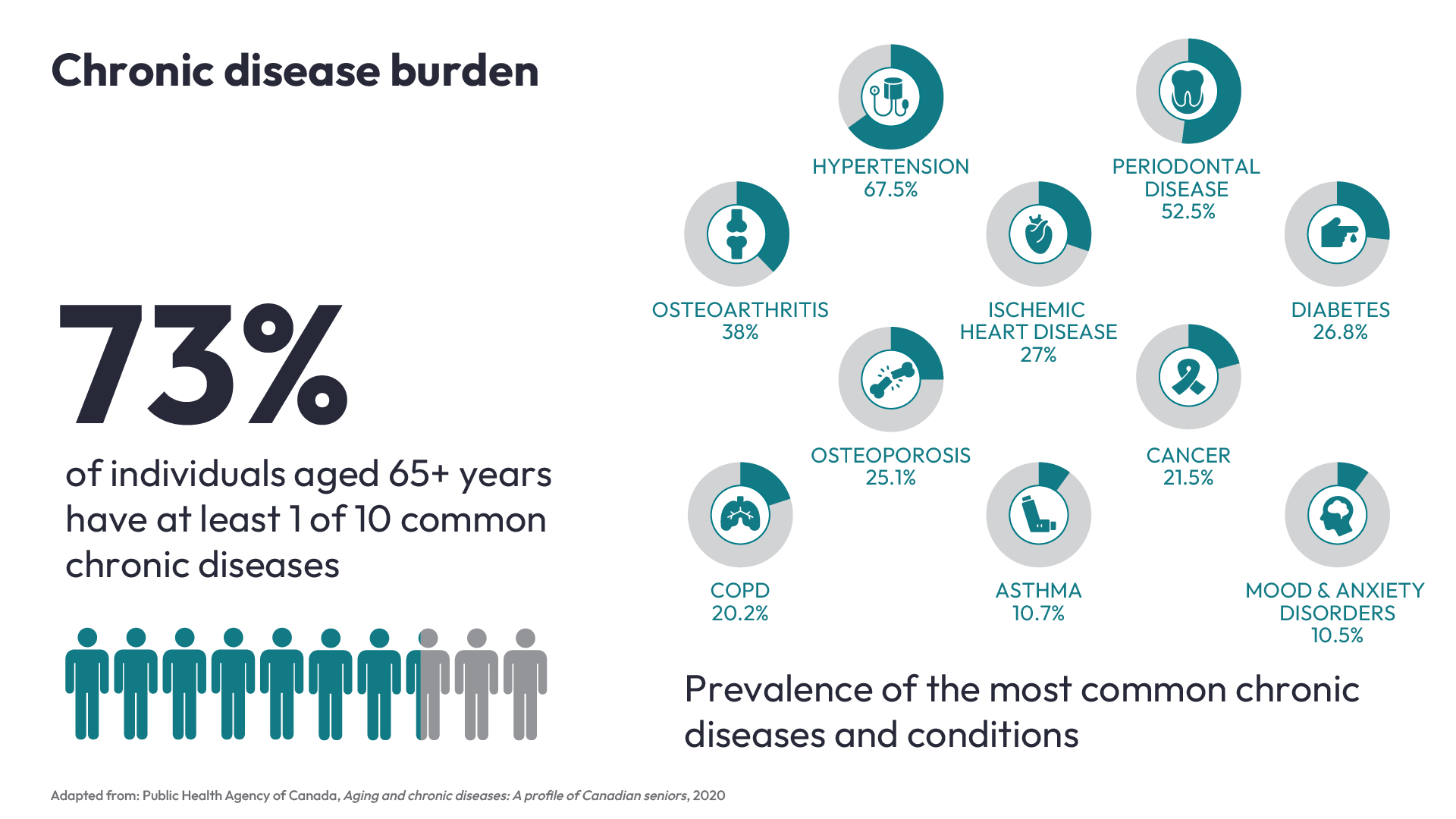
Long Description
Figure 4. Chronic Disease Burden
73% of individuals aged 65+ years have at least 1 of 10 common chronic diseases.
Prevalence of the most common chronic diseases and conditions:
- Hypertension (67.5%)
- Periodontal Disease (52.5%)
- Osteoarthritis (38%)
- Ischemic Heart Disease (27%)
- Diabetes (26.8%)
- Osteoporosis (25.1%)
- Cancer (21.5%)
- COPD (20.2%)
- Asthma (10.7%)
- Mood & Anxiety Disorders (10.5%)
-
Approach to the Strategic Planning Process and Setting Priorities
Informed by Many Voices Across our Community
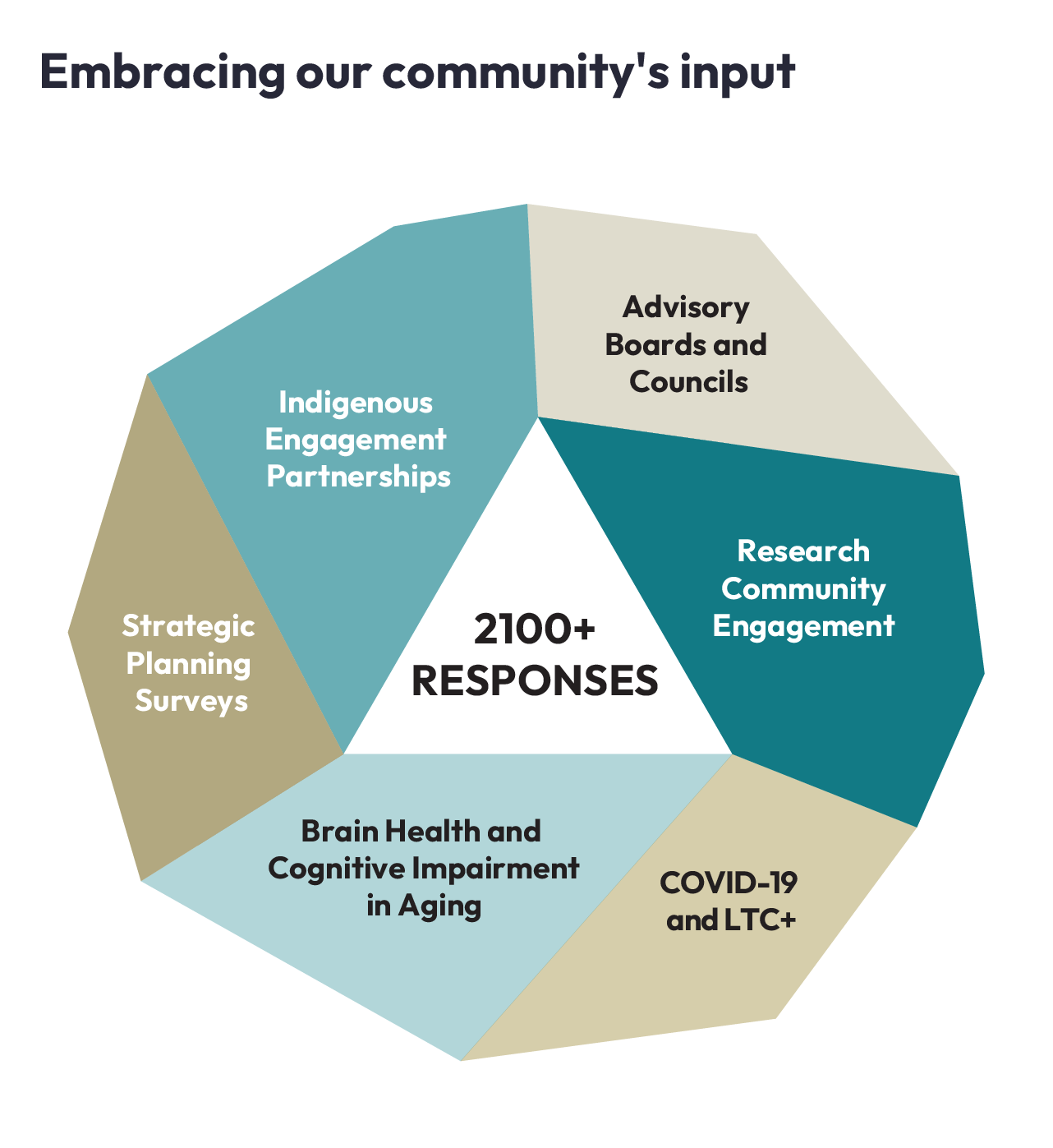
Long Description
Figure 5. Embracing Our Community's Input. 2,100+ responses from Advisory Board and Councils, Research Community Engagement, Indigenous Engagement Partnerships, Strategic Planning Surveys, Brain Health and Cognitive Impairment in Aging, COVID-19 and Long-Term Care.
We consulted widely with national and international partner organizations and individuals, including researchers, health care providers, funding partners, knowledge users, policy makers, community members and persons with lived and living experience of age-related disorders, to identify priorities for research on aging for the coming years. These consultations provided rich and thought-provoking insights that inspired and informed the development of this Strategic Plan. Information was compiled from over 2,100 responses through online surveys, virtual town halls, workshops, expert and partner interviews and engagement with our Institute Advisory Board, Older Adults Advisory Council and Regional Councils. This evidence-informed, iterative process began as the world shifted dramatically in response to the COVID-19 pandemic and has taken on board the impact of this changing world on the health, wellbeing and needs of older Canadians. Essential elements from early consultations were published as a timely article on COVID-19 and Priorities for Research on AgingFootnote 4. Our plan also encompasses consultations that led to the creation of the Brain Health and Cognitive Impairment in Aging Research Initiative in 2022. A prioritization exercise was performed by an independent and value-neutral consultant, and our priorities were then validated through a series of four virtual, Canada-wide research community sessions attended by over 300 researchers, clinicians and trainees working in the field of research on aging.
"Informed by extensive engagement with major stakeholders, this Strategic Plan is an exciting framework for effective implementation of research projects and evaluation of their impact. The three Directions and Strategic Priorities, as well as the focused areas of research, will meaningfully engage and improve health and well-being of older adults with diverse abilities and backgrounds in Canada."
As part of our commitment to Indigenous-led research on the health of older adults and to accelerating the self-determination of Indigenous Peoples, we held a series of Indigenous Partnership Engagements with Indigenous Elders/Knowledge Keepers, Indigenous researchers, trainees and community members where conversations were guided by an Indigenous consultant. We have had opportunities to listen to priorities for Indigenous communities, including rural and urban needs of First Nations, Inuit and Métis older adults and caregivers, and plan to meaningfully engage with Indigenous communities to seek guidance on how to appropriately address health of Indigenous older adults. As we work toward the goals of Truth and Reconciliation, we will prioritize community needs in our actions while addressing the research gaps on Indigenous perspectives on aging, building research capacity and increasing equitable funding for Indigenous-led research.
What We Heard
- Older adults and concepts of age and aging must be included in research activities
- Older adults must be recognized as bringing significant value, contributions and opportunities to their communities
- Persons with lived and living experience should play a role in research across the entire research ecosystem
- More Indigenous perspectives on aging are needed in research activities
- Ageism and stigma against older adults are critical social and structural determinants of health
- Date modified: